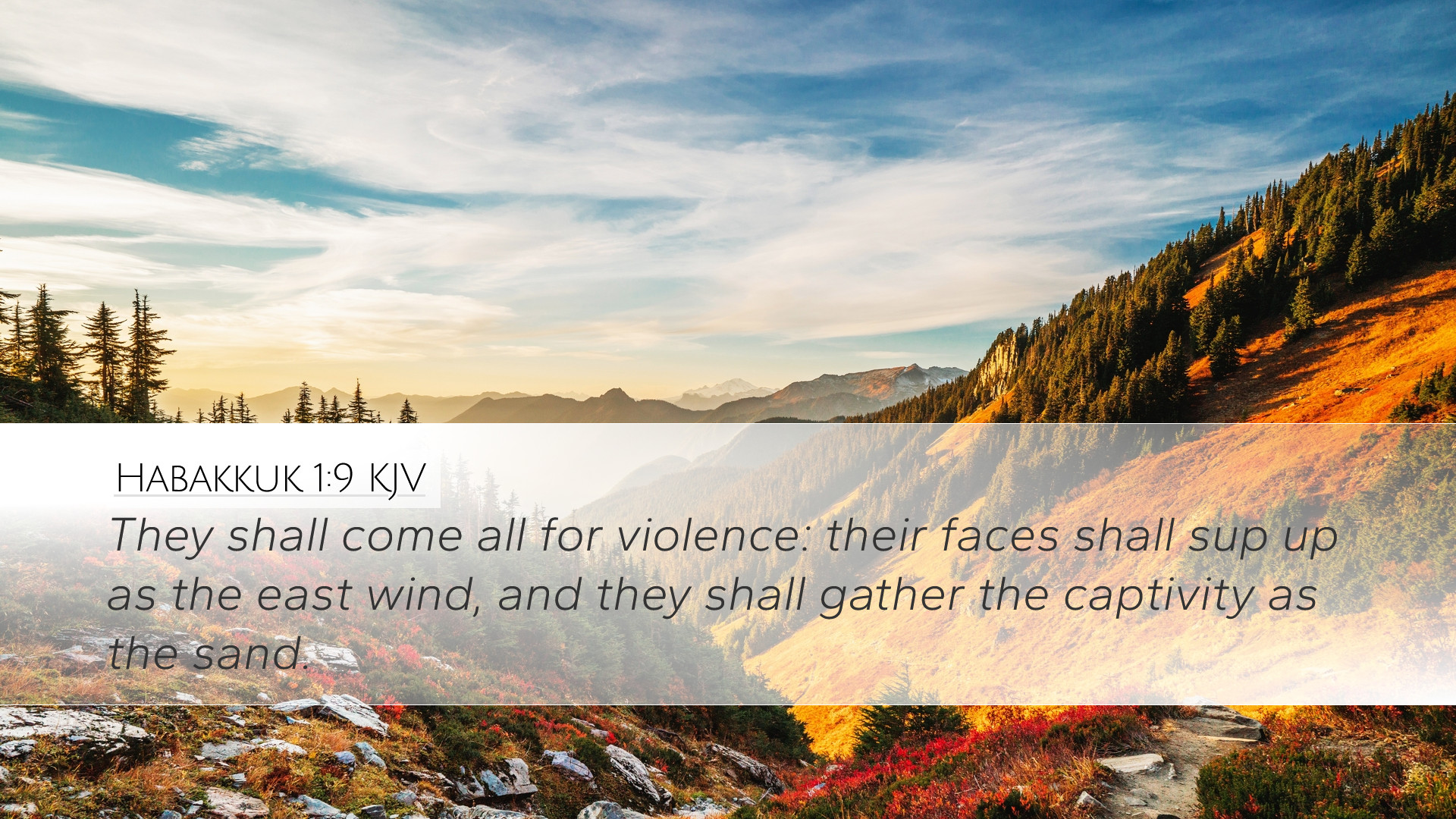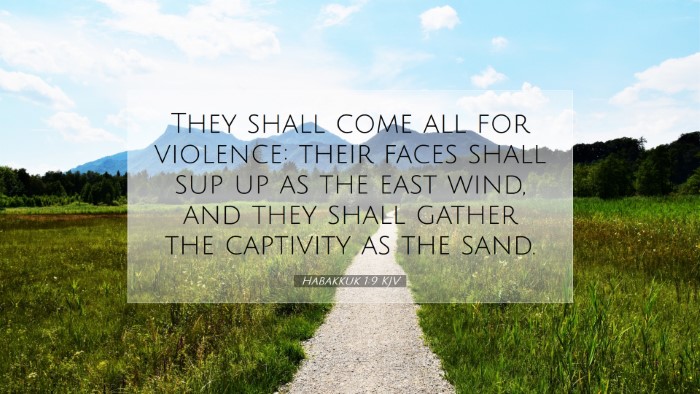Old Testament
Genesis Exodus Leviticus Numbers Deuteronomy Joshua Judges Ruth 1 Samuel 2 Samuel 1 Kings 2 Kings 1 Chronicles 2 Chronicles Ezra Nehemiah Esther Job Psalms Proverbs Ecclesiastes Song of Solomon Isaiah Jeremiah Lamentations Ezekiel Daniel Hosea Joel Amos Obadiah Jonah Micah Nahum Habakkuk Zephaniah Haggai Zechariah MalachiHabakkuk 1:9
Habakkuk 1:9 KJV
They shall come all for violence: their faces shall sup up as the east wind, and they shall gather the captivity as the sand.
Habakkuk 1:9 Bible Commentary
Commentary on Habakkuk 1:9
Verse Preview: "They shall come all for violence: their faces shall sup up as the east wind; and they shall gather the captivity as the sand."
Contextual Overview
The book of Habakkuk, one of the twelve Minor Prophets, presents a dialogue between the prophet and God regarding the apparent injustice and suffering experienced by God's people. This particular verse arises during Habakkuk's lament over the Babylonians and their brutal ways, serving as a commentary on the nature and implications of their military aggression.
Insights from Public Domain Commentaries
Matthew Henry's Commentary
Matthew Henry observes that the Babylonians are depicted as a national scourge, likening their aggressive demeanor to a violent tempest. He notes the phrase "for violence," emphasizing that their primary motivation is brutal conquest. Henry interprets the "faces" of the Babylonian captors, characterized by energy and pride, indicating their confidence in their wicked pursuits. He highlights that their swiftness in action is likened to the east wind, known for its fierceness and rapid onset. This imagery serves to demonstrate their insatiable appetite for expansion and domination.
Albert Barnes' Notes on the Bible
Albert Barnes further elaborates on the metaphoric language used in this verse. He explains that the phrase “they shall come all for violence” captures the inevitability of the Babylonian invasion. Barnes suggests that this reflects a theological principle where God sometimes uses wicked nations as instruments of judgment. He points out the comparison of their faces to the "east wind," which signifies not just their ferocity but also indicates a coming calamity for Judah. Barnes emphasizes the role of divine sovereignty in allowing such forces to rise and execute His judgments, thereby bringing attention to the righteousness of God amidst human — and granted, sinful — actions.
Adam Clarke's Commentary
Adam Clarke's insights delve into the implications of such violence on societal structures and the moral fabric of community life. Clarke argues that the Babylonian spirit is one of ruthless domination, drawing parallels to other historical empires that have pursued expansion with disregard for human life. He insists that the image of “gathering captivity as the sand” indicates not just the quantity of captives but also the ease with which they are subjected to bondage, suggesting that their tyranny is as overwhelming and pervasive as natural grains of sand. Clarke also chastises the complacency of Judah, warning that unless repentance is sought, judgment will be relentless and inevitable.
Theological Reflections
In synthesizing these insights, it becomes clear that Habakkuk 1:9 serves as a poignant reminder of the complexities in the discourse of justice within the divine-human relationship. The acknowledgment of divine sovereignty over nations and the means by which God executes His will raise critical theological questions relevant to contemporary faith communities. Pastors and theologians might reflect on God's omnipotence juxtaposed with human agency, leading to discussions on how faith communities respond in times of national and spiritual duress.
Application for Pastors and Scholars
- Awareness of Context: Understanding the socio-political context of Habakkuk’s prophecies sheds light on how modern believers can navigate injustice in society and foster a robust hope in God’s ultimate justice.
- Seriousness of Sin: This passage serves to underline the notion that God does not overlook violence and cruelty. Pastors are encouraged to address these themes in their teachings, prompting their congregations to cultivate a commitment to justice and righteousness.
- The Nature of Divine Judgment: The commentary suggests the necessity of preaching about the nature of God’s judgment. It stimulates discussions concerning how God disciplines nations and individuals, prompting reflections on personal and communal repentance.
- Faith Amidst Adversity: Encouraging congregants to hold onto their faith during oppressive times echoes the core message of Habakkuk, leading to empowerment through prayer and communal solidarity.
Conclusion
In summary, Habakkuk 1:9 encapsulates a powerful declaration of God's interaction with nations, particularly the Babylonian empire. Through their violent disposition, the Babylonians serve as a reminder of the raw realities of sin and its consequences. The insights drawn from Matthew Henry, Albert Barnes, and Adam Clarke allow modern readers to engage deeply with the text, offering an opportunity for reflection, teaching, and application in spiritual and communal life.


